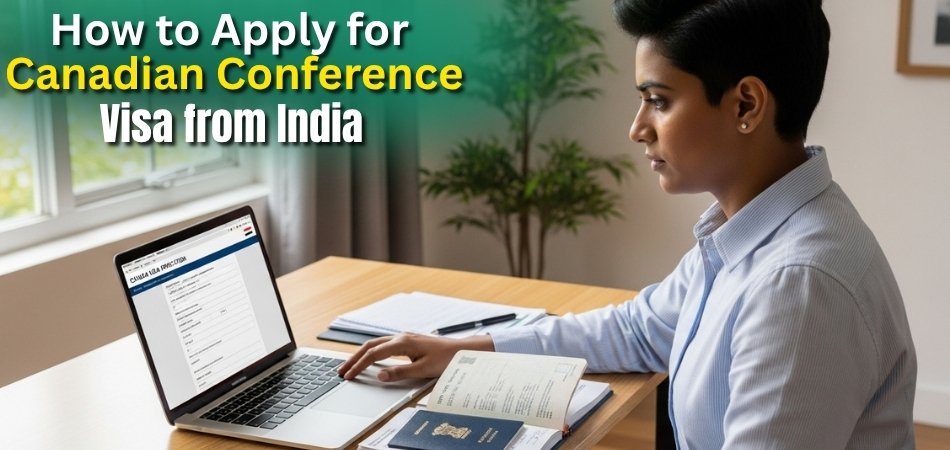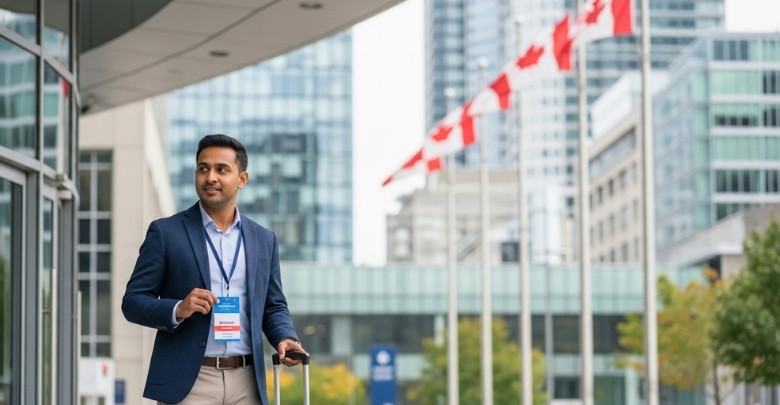It can be exciting to attend a conference in Canada. But before you travel, you need a special visa. For people in India, this is called a Temporary Resident Visa, also known as a conference visa. It allows you to enter Canada legally and attend your event.
So, how to apply for Canadian conference visa from India?
To apply for a Canadian conference visa from India, go to the official Canadian immigration website and create an account. Fill out the form for a Temporary Resident Visa. Add documents like your passport, bank proof, and a conference invite. Pay the fee, give biometrics, and wait for the result.
In this blog, we’ll guide you step by step through the full process.
How to Apply for Canadian Conference Visa from India?
Applying for a Canadian conference visa from India may feel overwhelming without proper guidance. A clear step-by-step process makes things simple. By following these steps carefully, you can prepare with confidence and avoid stressful mistakes.
Step 1: Create an Online Account
- Visit the official IRCC website and open an account for your visa application to begin smoothly. Ensure your details are accurate.
- Choose the Temporary Resident Visa category when applying specifically for conference attendance in Canada. This keeps everything organized.
- Write your personal information carefully and cross-check before moving forward. Wrong details may cause rejection or unnecessary complications.
- Keep your login credentials safe because you will need them often. Access to your application is only through it.
Step 2: Collect Important Documents
- Obtain a valid passport with six months’ validity beyond your travel dates. This ensures compliance with immigration requirements.
- Request an official invitation letter from the conference organizers. This will prove the purpose of your travel clearly.
- Gather financial evidence like updated bank statements or sponsorship letters. These demonstrate that you can cover all expenses.
- Prepare your travel itinerary along with hotel bookings. Authorities want to see your detailed plan during your Canadian visit.
Step 3: Pay the Visa Application Fees
- Log in to your IRCC account and use the secure payment portal. Always double-check the correct application fee.
- Keep a digital receipt after paying online. This serves as proof and should be stored with other essential records.
- Payment confirmation appears instantly on your account dashboard. Review it carefully to make sure everything was processed successfully.
- Only pay through official government channels for safety. Avoid using agents who demand direct cash, which can cause fraud.
Step 4: Provide Biometrics and Schedule an Appointment
- After submitting, book a biometrics appointment at a designated center. The confirmation email will contain the date and time.
- Carry your passport, payment receipt, and appointment letter. Missing any of these documents can delay your biometric process.
- Fingerprints and photographs are taken at the center. This information helps authorities verify your identity during visa processing.
- Complete biometrics as early as possible. Delaying this step may increase waiting times and affect travel preparation significantly.
Step 5: Prepare for the Visa Interview
- Some applicants may be called for an interview at the visa office. Arrive on time with documents.
- Officers often ask about your travel purpose, conference details, and funding sources. Answer with confidence and honesty.
- Carry original documents, including your passport, invitation letter, and financial proof. These will support your responses during questioning.
- Dress neatly and remain calm. Presenting yourself well creates a positive impression that can influence the final decision.
Step 6: Track Application and Await Decision
- Once all steps are done, track your visa status online. Updates appear directly on your IRCC account portal.
- Check your email often. Authorities may request additional documents, and late responses can lead to unnecessary application delays.
- Processing times vary depending on workload and location. Stay patient and plan your travel only after final approval.
- If approved, download the visa document and review the details carefully. Inform the conference in Canada organizers about confirmation.
What Are the Required Documents for a Canada Conference Visitor Visa?
Applying for a Canada Conference Visitor Visa requires careful preparation and the right documents. Each paper proves your travel purpose, financial stability, and intent to return home. Missing a single requirement can delay the process or cause refusal. Here are the important documents you must organize before applying.
- Valid Passport: A passport with at least six months’ validity beyond travel dates confirms identity, while providing essential details for immigration officers to verify.
- Invitation Letter: A signed invitation from conference organizers states the purpose of your trip, while supporting your application by showing event confirmation.
- Financial Proof: Bank statements or sponsorship letters demonstrate funds for the visit, while assuring authorities that all expenses will be covered.
- Travel Plan: A complete itinerary with booked flights and accommodation details gives clarity about your journey, while ensuring transparency for visa officials.
- Photographs Required: Recent passport-sized photos following official Canadian guidelines are necessary, while helping match your identity during background verification steps.
- Employment Records: Letters from your employer confirm your current job status and granted leave, while highlighting ties to home country responsibilities.
- Conference Details: Registration proof and event information show genuine reasons for travel, while aligning your purpose with the Temporary Resident Visa requirements.
- Previous Travel Proof: Old visas or travel stamps provide immigration officers with a history of responsible travel, while supporting the credibility of your application.
How Much Does the Visa and Biometric Process Cost for Indians?
The cost for Indians applying for a Canadian conference visa includes two main fees. The base visa fee ranges between CAD 100 and CAD 150, depending on application specifics. Biometrics adds about CAD 85, making the total CAD 185 to CAD 235. Extra charges may apply for courier, faster services, or other optional assistance. Here is the cost breakdown.
Visa Application Fee
The primary fee for the application ranges from CAD 100 to CAD 150, depending on the travel purpose. This fee covers processing your documents and details, ensuring your application gets a proper review by Canadian immigration officers. Payment is made through the official portal using secure methods, which prevent fraud and protect your personal details. Applicants must confirm the fee amount carefully before submission because any incorrect payment may delay approval or cancel the application.
Biometric Fee Requirement
Biometric enrollment costs approximately CAD 85, which is mandatory for most applicants traveling from India. The process involves fingerprints and photographs taken at designated collection centers. This step helps immigration authorities confirm identity and protect against fraudulent applications or false information. Completing biometrics promptly avoids delays and ensures your visa processing continues without unnecessary interruptions.
Express Processing Options
Some applicants choose express services, which increase costs depending on the processing speed selected. Faster reviews may help when travel dates are very near. However, these additional fees vary by provider and are not included in the standard government charges. Applicants should check official guidelines before selecting expedited services to avoid confusion or extra expenses.
Courier and Delivery Charges
Applicants sometimes pay courier charges for delivering passports or documents back after completion. These charges depend on location, service speed, and delivery method. Using courier services provides security for sensitive documents and saves time spent collecting papers directly. Fees are optional, but can add noticeable costs if frequent communication or deliveries are needed.
Travel Document Preparation
Preparing documents like hotel bookings, travel insurance, and flight reservations may involve extra costs. Immigration officials expect clear and detailed records of travel plans. Many applicants purchase travel insurance policies, which increase overall expenses but provide safety during international journeys. Keeping every required document ready prevents last-minute delays and reduces the chance of rejections.
Financial Stability Proof
Applicants must show strong financial documents, which sometimes require certified bank statements or notarized sponsorship letters. Getting these documents prepared professionally may involve additional costs. Authorities want clear evidence of funds that cover all travel and stay expenses. For many travelers, getting a Canada conference visa becomes easier when accurate financial proof supports the application.
Additional Interview Expenses
If called for an interview, applicants may face costs like transportation, food, and accommodation near the visa office. These expenses are personal but still add to the total application journey. Carrying original documents ensures confidence during questioning, avoiding repeat visits or delays. Although not official fees, interview-related costs affect the overall budget significantly.
How Long Does Processing Take for Canadian Conference Visas?
The processing time for Canadian conference visas usually takes about 24 days for applicants from India. This timeline often changes because it depends on many factors, including how quickly you complete each required step. While standard cases may finish in 20 to 30 days, delays can easily extend the process. Here are the facts that impact the timeline.
Application Completeness
Submitting a complete application reduces waiting periods and ensures quicker progress. Missing documents or unclear details slow down officer reviews considerably. Always double-check every form and attachment before submission. Incomplete applications often cause longer delays, making early preparation an important part of successful visa approval.
Biometric Appointment Scheduling
Biometrics must be completed before processing moves forward. Scheduling delays at collection centers can significantly stretch the overall timeline. Applicants should book their appointment quickly after receiving the instruction letter. Faster completion of biometrics allows the application to progress without unnecessary interruptions.
Seasonal Demand Pressure
Demand for visas rises sharply during peak travel seasons. This increases workloads for officers and extends waiting periods for applicants. Applying during busy months may result in longer reviews. Submitting early before peak seasons helps reduce delays and provides more certainty for travel plans.
Additional Document Requests
Sometimes officers request extra documents for further clarification. These requests extend the processing time until applicants provide the required information. Prompt responses reduce unnecessary delays in the review cycle. Organizing documents in advance ensures faster replies when additional proof is needed.
Applicant Travel History
Officers consider travel records during the review process. Applicants with consistent travel history usually experience quicker assessments of their applications. Missing or limited history may lead to extended scrutiny. Providing older visas and stamps helps support trustworthiness and speeds up evaluation.
Office Workload Variations
Different Canadian visa offices manage different workloads. Some centers face heavier demand, which naturally slows application processing for travelers. Checking regional office timelines provides a clearer estimate. Choosing less crowded centers may sometimes shorten the waiting time.
Things You Can Do With a Canadian Conference Visa
Traveling abroad can feel exciting because it gives you the chance to see a new country and meet new people. Getting the right visa matters a lot, since it helps you enter legally without unnecessary issues. With the Canadian conference visa, there are several opportunities that open up once your application gets approved. Learn what you can do from below to keep everything simple.
Attend Conferences
The main reason for this visa is to attend official conferences in Canada. You can take part in discussions, presentations, and workshops that match your interests. Meeting professionals at these events helps you learn new ideas and share your own thoughts. It is the perfect chance to connect with people who share your field.
Meet Professionals
While in Canada, you can meet experts and professionals working in similar areas. These conversations often bring new insights and helpful advice. Talking face-to-face makes building connections much easier than just online messages. You may even create lasting relationships with people who share your goals.
Explore Learning
Many conferences include extra training sessions or group learning activities. You can join them to improve your skills and knowledge. Attending these sessions makes you understand more about your subject in an enjoyable way. It feels more fun than traditional classrooms because everyone is actively sharing ideas.
Visit Cities
During free time, you are free to look around the Canadian cities where the conference is held. Walking around local streets shows you daily life beyond the event. You can try Canadian food, visit landmarks, and take memorable photos. Exploring different places adds joy to the main purpose of your trip.
Cultural Experience
A Canadian conference visa also allows you to enjoy cultural experiences in the country. Festivals, museums, and art centers often share stories about Canadian life. Visiting such places makes your trip interesting while teaching you new traditions. This adds value to your travel beyond the official meetings.
Official Meetings
Sometimes conferences lead to official side meetings with organizers or other groups. You can attend those meetings to discuss collaborations or plans. Carrying proper documents ensures you join these discussions without trouble. Remember, attending a conference in Canada without a visa is not allowed, so your visa makes this possible.
Travel Options
The visa lets you travel around Canada after your main event is complete. You can plan short trips nearby without any issues. Many visitors enjoy exploring nature parks, lakes, or nearby towns. This chance gives you both learning and leisure in one trip.
FAQs About Canadian Visa Application Process From India
Applying for a Canadian conference visa often raises many doubts. To help you understand the process better, here are some frequently asked questions and their answers. Each one explains details you may not find easily elsewhere.
Can I Apply Without a Travel Itinerary?
Yes, you can start your application without a final itinerary, but having a clear travel plan is always better. Submitting tentative bookings, hotel details, and planned routes shows preparation. It makes your application stronger and reduces unnecessary questioning.
Do I Need Travel Insurance for the Visa?
Travel insurance is not a strict requirement for the Canadian conference visa. However, it is highly recommended for safety. Having insurance provides coverage for emergencies, medical care, and sudden trip cancellations, which strengthens your travel readiness.
Is An Invitation Letter Mandatory?
Yes, an invitation letter is usually required when applying for a Canadian conference visa. It proves your reason for travel. Conference organizers provide this letter, and you must upload it with your application as strong supporting evidence.
Can I Apply Through an Agent?
You may apply using a visa consultant or agent, but applying directly online through the official IRCC website is safer. Agents often charge extra fees, while online applications give more control over your details and documents.
What If My Application Gets Refused?
If your application is refused, you can reapply after fixing the issues. Carefully read the refusal letter and understand the reasons. Correcting missing documents, improving financial proof, or clarifying travel purpose improves your chances of approval.
Can I Extend My Stay After the Conference?
Yes, you can request an extension if you wish to stay longer in Canada. Apply before your visa expires and provide strong reasons. Extensions require updated financial proof, accommodation details, and sometimes fresh biometrics for approval.
Do Students Qualify for This Visa?
Students can apply if they receive an invitation to attend or present at a Canadian conference. They must submit documents proving enrollment, financial support, and conference participation. Strong paperwork ensures smooth approval for students interested in professional events abroad.
Can I Travel With Family on This Visa?
Family members cannot join you under the same visa. They must apply separately for visitor visas. Each applicant needs individual documents, financial proof, and reasons for travel. Applying together ensures you can attend the conference while they accompany.
Concluding Thoughts
Simple steps are needed to get a Canadian conference visa. You create an account, fill out the form, add documents, pay fees, and give biometrics. Each part is important for quick approval and fewer delays. Knowing the documents, costs, and processing time makes planning easy.
When your visa is approved, you can attend your event and also enjoy Canada. Learning how to apply for Canadian conference visa from India helps you stay ready without stress. With the right preparation, you can focus on the conference and enjoy a smooth trip abroad.








